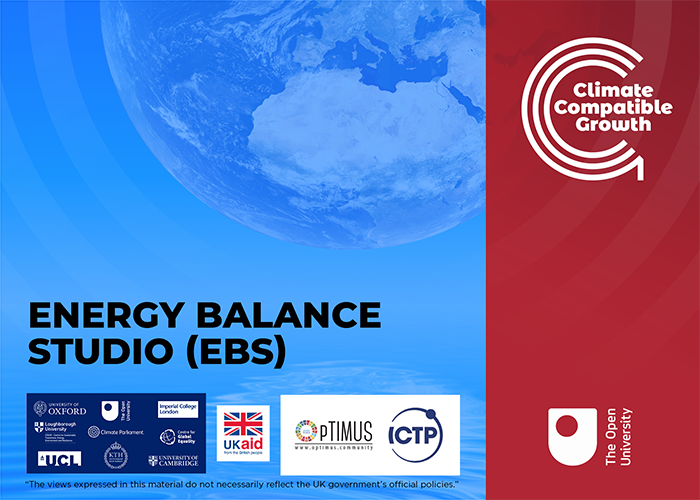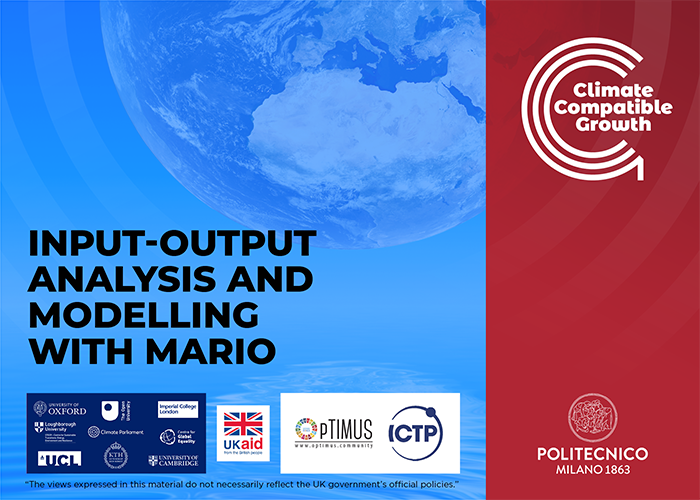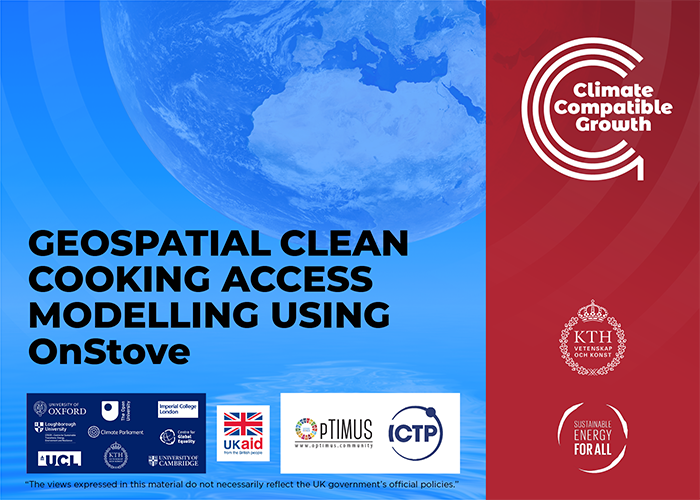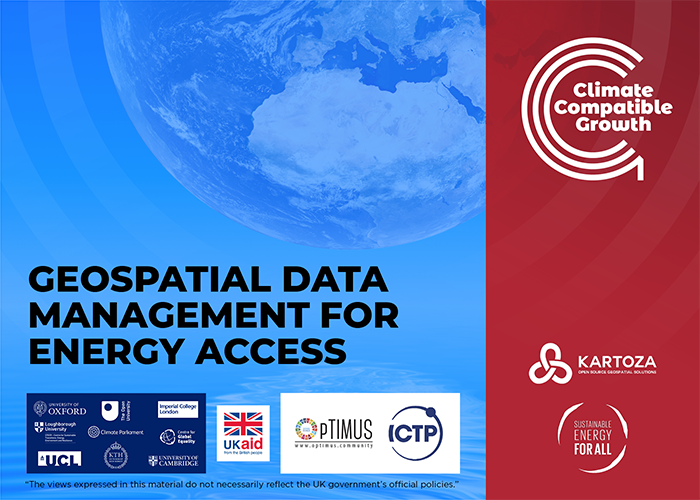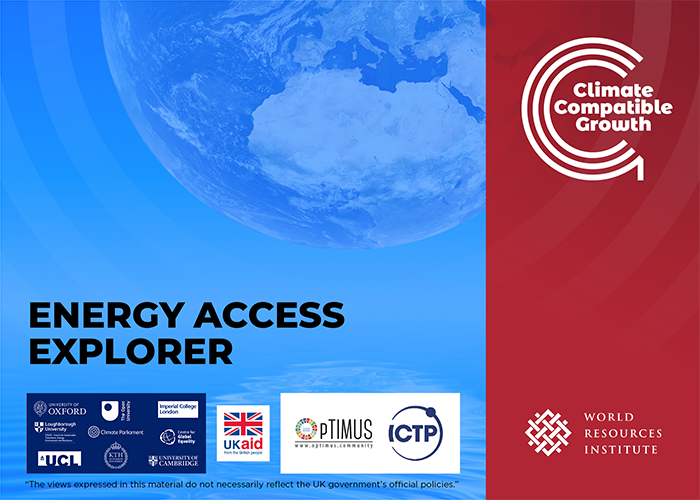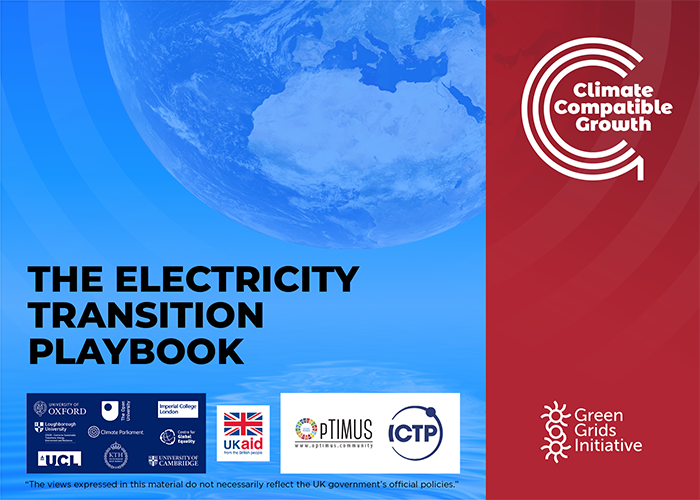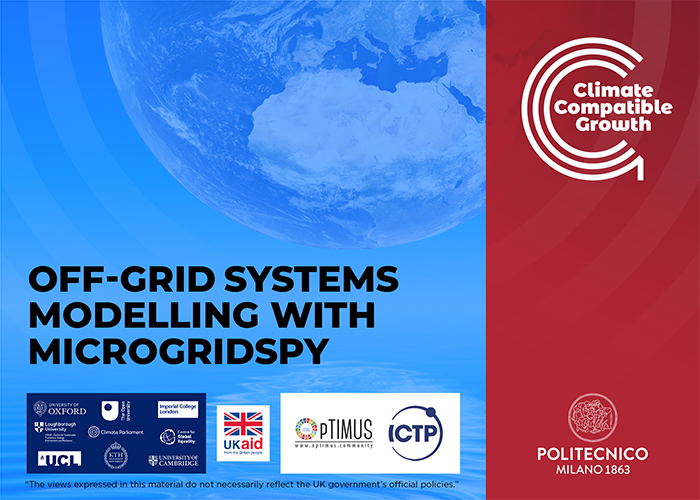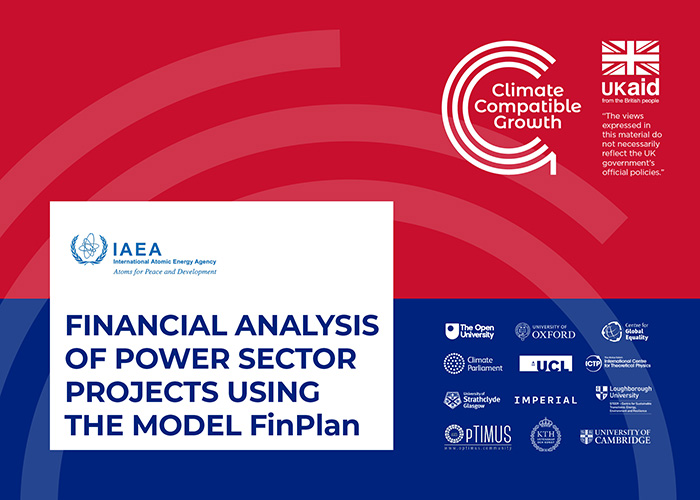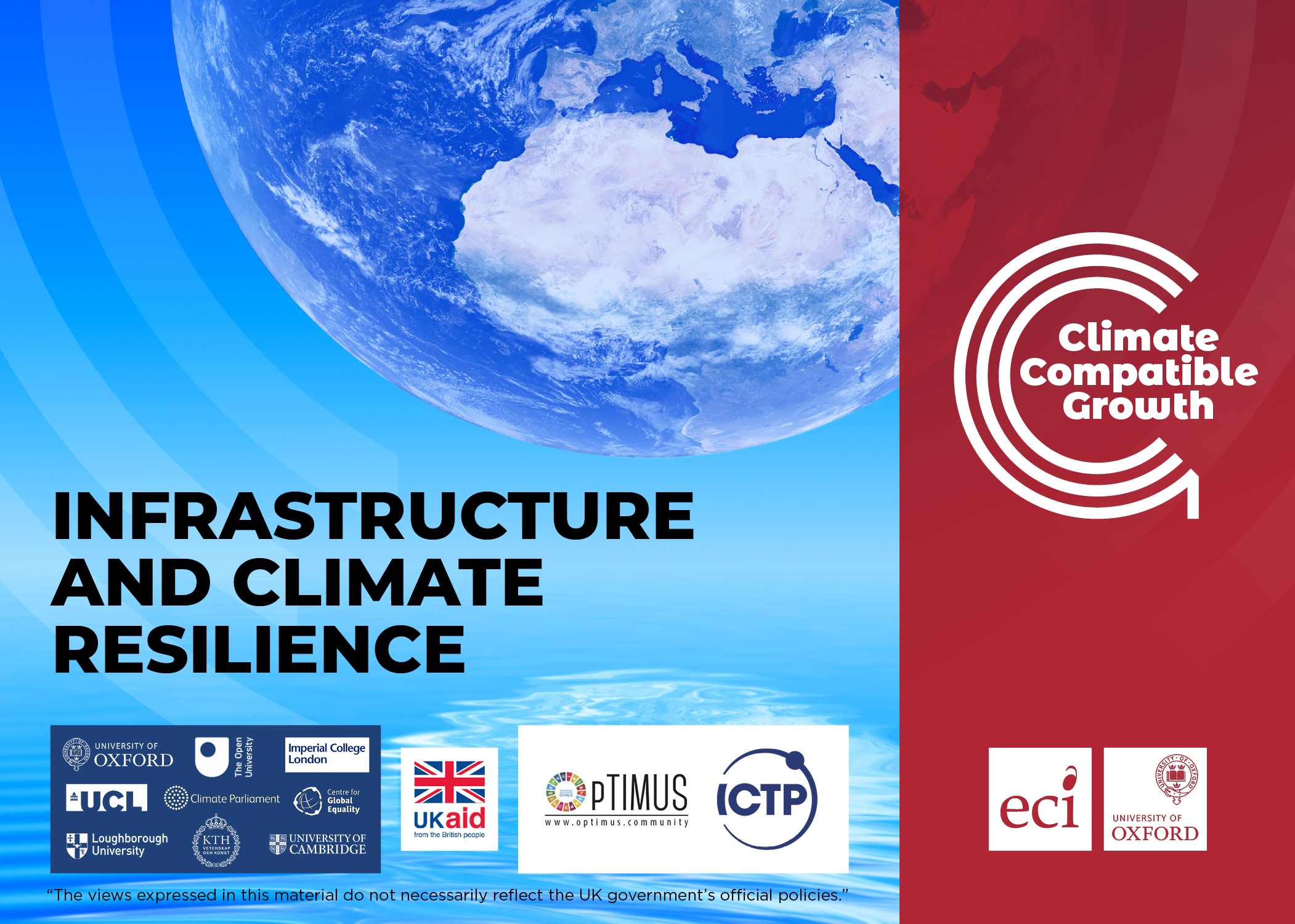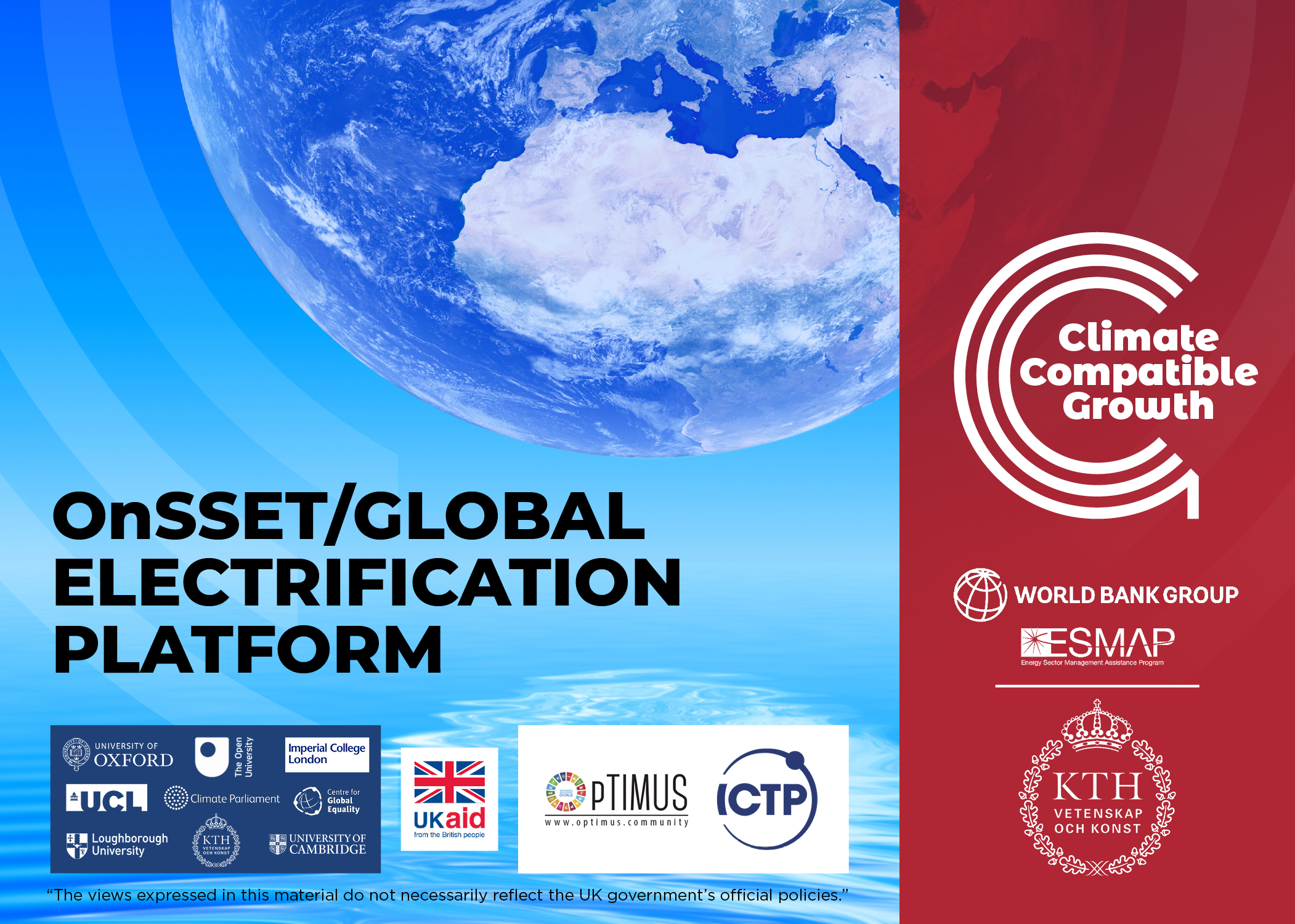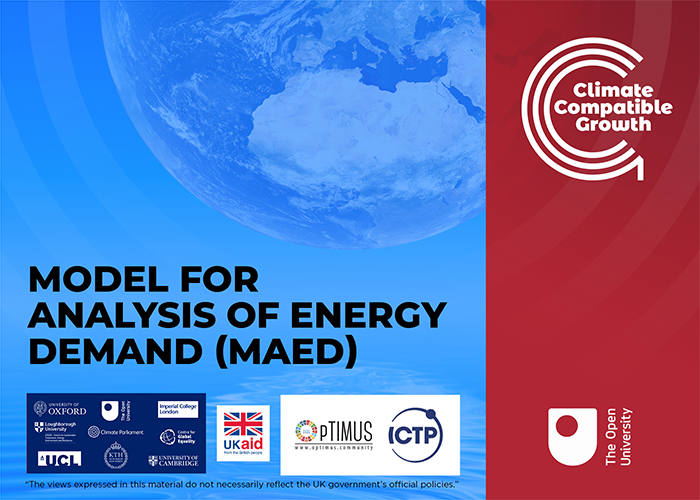-
-
Input-Output analysis and modelling with MARIO
The main goal of the course is to introduce you to the fundamentals of quantitative impact assessment methods and models. These quantitative models are specifically designed to assess the prospective environmental and economic impacts resulting from the application of technological or policy interventions at meso and macro-scale, comprehensively including supply-chain effects in a Life Cycle perspective.
Course
40 hrs
-
Geospatial clean cooking access modelling using OnStove
In this course you will be introduced to OnStove, an open-source spatial clean cookingtool identifying the best cooking solutions across any given area based on their costsand benefits. The track will take you from start to finish, from creating your own spatialrepository to modifying your spatial data, calculating the net-benefits of differentcooking solutions and lastly visualizing and presenting your results.
Course
32 hrs
-
Off-Grid Energy Systems Modelling with MicroGridsPy
Explore the computational aspects of energy system modelling, delve into the technological components of third-generation minigrids, and discover MicroGridsPy, an open-source Python framework for optimal sizing of minigrids.
Course
40 hrs
-
-
FIFA Guardians™ Embedding Safeguarding Practice
This course extends your knowledge of some central safeguarding topics and explains some new principles and practices. It also provides you with the knowledge to help you embed safeguarding practice across your organisation.
Course
20 hrs
-
-
Open Research
This course will help you make your research more open as you explore the the underlying principles of open research: transparency, integrity, and accessibility and consider how to ensure your own research outputs meet all three of these standards.
Course
8 hrs
-
-
-
FIFA Guardians™ Fundamentos de salvaguardia
Una introducción a los conocimientos esenciales de la salvaguardia para las federaciones de fútbol y las federaciones miembro de la FIFA; el curso de 90 minutos explica qué es la salvaguardia, por qué es importante, y cómo usted puede ayudar a reducir los riesgos y a responder adecuadamente ante cualquier preocupación sobre la salvaguardia.
Course
2 hrs
-
FIFA Guardians™ Aquí comienza su camino en la salvaguardia
Este curso es el segundo de un ciclo de cursos destinados a desarrollar los conocimientos de los alumnos y las alumnas en materia de salvaguardia y protección y a mejorar la práctica laboral de los responsables de salvaguardia y protección.
Course
12 hrs
-
FIFA Guardians™ Claves para integrar las prácticas de salvaguardia
Este curso amplía sus conocimientos sobre algunos de los temas centrales de salvaguardia y protección ya tratados e introduce nuevos principios y prácticas. También le brinda los conocimientos necesarios para poder integrar las buenas prácticas de salvaguardia y protección por toda su organización y que acumule experiencia diversa.
Course
20 hrs
-
FIFA Guardians™ Promover un cambio más amplio en la salvaguardia
Este curso ha sido diseñado para ayudarle a pensar acerca de cómo su organización podría aprender de las experiencias de salvaguardia y desarrollar una cultura de salvaguardia positiva. También refuerza sus conocimientos actuales y le ayudará a identificar los puntos fuertes y débiles de la organización.
Course
7 hrs
-
-
-
FIFA Guardians™ Fondamentaux de la protection
Une introduction aux principes fondamentaux en matière de protection destinée aux associations membres de la FIFA et aux acteurs du football en général. Le cours de 90 minutes explique ce qu'est la protection, pourquoi elle est importante et comment faire pour réduire les risques et répondre adéquatement aux situations de préoccupation liées à la protection.
Course
2 hrs
-
FIFA Guardians™ Commencer votre parcours de protection
Ce cours est le deuxième d’une série de cours visant à développer les connaissances des apprenant(e)s dans le domaine de la protection et à améliorer la pratique professionnelle des responsables de la protection.
Course
12 hrs
-
FIFA Guardians™ Intégrer les bonnes pratiques de protection
Cette formation élargit vos connaissances sur certains thèmes centraux de la prévention (en faveur des enfants) et explique également de nouveaux principes et de nouvelles pratiques clés. Elle vous apporte également les connaissances nécessaires qui vous aideront à intégrer la pratique de la prévention en faveur des enfants dans votre organisation et à développer votre expérience.
Course
20 hrs
-
FIFA Guardians™ Promouvoir un plus grand changement dans la protection
Ce cours est conçu pour vous aider à réfléchir à la façon dont votre organisation peut tirer des leçons des affaires de protection et développer une culture positive de protection. Il consolide également vos connaissances existantes et vous aide à identifier les forces et les faiblesses de votre organisation.
Course
7 hrs
-
-
-
FINPLAN : Proficiency badges
The FINPLAN (Financial Planning Model) Badge recognizes excellence in applying the International Atomic Energy Agency’s financial simulation tool to evaluate and optimize national energy investment strategies. It honors individuals or organizations using FINPLAN to assess the financial performance, costs, and economic implications of energy system development plans. Recipients demonstrate leadership in integrating financial, technical, and policy data to support sustainable, economically viable energy transitions. The badge highlights commitment to evidence-based financial planning, transparency, and progress toward SDG 7: Affordable and Clean Energy. It celebrates analytical rigor, foresight, and collaboration in advancing sound and sustainable energy financing decisions.
Competition
1 hr
-
NISMOD : Proficiency Badges
The NISMOD (National Infrastructure Systems MODel) Badge recognizes excellence in applying integrated infrastructure modeling to support sustainable national planning and policy design. It honors individuals or organizations leveraging NISMOD to analyze interactions between energy, transport, water, digital, and other critical infrastructure systems. Recipients demonstrate leadership in using data-driven simulations to assess long-term investment needs, resilience, and sustainability outcomes. The badge highlights commitment to evidence-based decision-making, cross-sectoral coordination, and progress toward achieving the Sustainable Development Goals. It celebrates analytical integration, innovation, and collaboration in advancing resilient and inclusive infrastructure systems.
Competition
1 hr
-
EAE : Proficiency Badges
The Energy Access Explorer Badge recognizes excellence in using the World Resources Institute’s open-source geospatial platform to advance sustainable energy access. It honours individuals or organizations applying data-driven insights to identify and address energy needs in underserved areas. Recipients demonstrate leadership in integrating geospatial analysis, inclusivity, and clean energy planning. The badge highlights commitment to evidence-based decision-making and progress toward SDG 7: Affordable and Clean Energy. It recognises innovation, transparency, and collaboration in expanding equitable energy access.
Competition
1 hr
-
OnSSET Proficiency Badges
The OnSSET (Open Source Spatial Electrification Tool) Badge recognizes excellence in applying open-source geospatial modeling to advance sustainable electrification planning. It honors individuals or organizations leveraging OnSSET to analyze least-cost electrification pathways and design data-driven strategies for achieving universal energy access. Recipients demonstrate leadership in integrating spatial data, energy technologies, and demographic insights to guide investment and policy decisions. The badge highlights commitment to evidence-based planning, transparency, and progress toward SDG 7: Affordable and Clean Energy. It celebrates innovation, inclusivity, and collaboration in expanding equitable and sustainable electricity access.
Competition
1 hr
-
MAED : Proficiency Badges
The MAED Excellence Badge recognizes outstanding proficiency in using the International Atomic Energy Agency’s (IAEA) Model for Analysis of Energy Demand to support sustainable energy planning and policy development. It honors individuals or organizations that apply rigorous, data-driven modeling to assess future energy needs across sectors and scenarios. Recipients demonstrate leadership in integrating socio-economic, technological, and demographic factors into comprehensive energy demand projections. The badge reflects a commitment to evidence-based planning, strategic foresight, and alignment with national development and climate goals. It celebrates analytical excellence, innovation, and collaboration in advancing sustainable and equitable energy systems.
Competition
1 hr
-
CLEWs - Bronze Proficiency Badge
This intermediate-level certification recognises practical experience in CLEWs (Climate, Land, Energy and Water systems) modelling with OSeMOSYS. The certification emphasises hands-on experience with developing and debugging national-scale CLEWs modelling systems, scenario analysis, and the ability to begin addressing real-world energy planning challenges.
Competition
1 hr
-
CLEWs - Silver Proficiency Badge
This advanced-level certification validates substantial practical experience in CLEWs modelling with OSeMOSYS. It demonstrates the ability to develop and apply complex models to real-world challenges, effectively communicate results, and adapt modelling approaches to different contexts. The certification emphasises both technical expertise and the ability to derive meaningful policy insights from modelling work.
Competition
1 hr
-
CLEWs - Gold Proficiency Badge
This expert-level certification recognizes mastery in CLEWs modelling real-world energy planning challenges. It validates the ability to either develop innovative solutions to complex energy challenges, manage sophisticated modelling projects, and, or effectively translate technical insights into high-level policy recommendations.
Competition
1 hr
-
CLEWs - Associate Instructor Badge
This certification recognises the ability to effectively support and deliver CLEWs modelling training. It validates capabilities in teaching specific aspects of CLEWs, adapting teaching methods to diverse learners, and providing constructive feedback on modelling exercises. The qualification ensures instructors can effectively communicate complex modelling concepts to novice learners.
Competition
1 hr
-
OSeMOSYS - Lead Instructor Badge
This advanced teaching certification recognizes expertise in designing and delivering comprehensive OSeMOSYS training programs. It validates the ability to create sophisticated training materials, mentor other instructors, and adapt programs to diverse learning contexts. The qualification ensures instructors can lead complex training initiatives while advancing modelling education methodology.
Competition
1 hr
-
CLEWs - Lead Instructor Badge
This advanced teaching certification recognizes expertise in designing and delivering comprehensive CLEWs training programs. It validates the ability to create sophisticated training materials, mentor other instructors, and adapt programs to diverse learning contexts. The qualification ensures instructors can lead complex training initiatives while advancing modelling education methodology.
Competition
1 hr
-
OSeMOSYS - Bronze Proficiency Badge
This intermediate-level certification validates practical experience in energy systems modelling with OSeMOSYS. It demonstrates ability to develop, construct and debug national-scale energy system modelling systems while understanding their role in policy decisions. The certification emphasises hands-on experience with scenario analysis, model calibration, and result interpretation, preparing modellers to address real-world energy planning challenges.
Competition
1 hr
-
OSeMOSYS - Silver Proficiency Badge
This advanced-level certification validates substantial practical experience in energy systems modelling with OSeMOSYS. It demonstrates the ability to develop and apply complex models to real-world challenges, effectively communicate results, and adapt modelling approaches to different contexts. The certification emphasises both technical expertise and the ability to derive meaningful policy insights from modelling work.
Competition
1 hr
-
OSeMOSYS - Gold Proficiency Badge
This expert-level certification recognizes mastery in energy systems modelling (OSeMOSYS) real-world energy planning challenges. It validates the ability to either develop innovative solutions to complex energy challenges, manage sophisticated modelling projects, and, or effectively translate technical insights into high-level policy recommendations.
Competition
1 hr
-
OSeMOSYS - Associate Instructor Badge
This certification recognises the ability to effectively support and deliver energy modelling training. It validates capabilities in teaching specific aspects of OSeMOSYS, adapting teaching methods to diverse learners, and providing constructive feedback on modelling exercises. The qualification ensures instructors can effectively communicate complex modelling concepts to novice learners.
Competition
1 hr
-
-
-
Introducing antimicrobial resistance (2025)
This course introduces how antibiotics work and how bacteria acquire and transmit resistance. It highlights examples of resistance mechanisms and pathogen-antimicrobial combinations from animal or human health.
Course
6 hrs
-
Isolating and identifying bacteria (human health) (2025)
This course covers microbiology techniques for isolating and identifying bacteria in clinical laboratories, including the key principles around sample collection and transport, and storage of isolates.
Course
6 hrs
-
Isolating and identifying bacteria (animal health) (2025)
This course examines the requirements for isolating and identifying pathogens important it animal health. It describes the importance of correct sampling, good laboratory practice and quality control measures.
Course
6 hrs
-
Antimicrobial susceptibility testing (2025)
This course covers disk diffusion tests and gives an overview of minimum inhibitory concentrations and breakpoints. It introduces data reporting and the importance of quality assurance in this process.
Course
6 hrs
My OpenLearn Create Profile
- Personalise your OpenLearn profile
- Save Your favourite content
- Get recognition for your learning
Already Registered?
